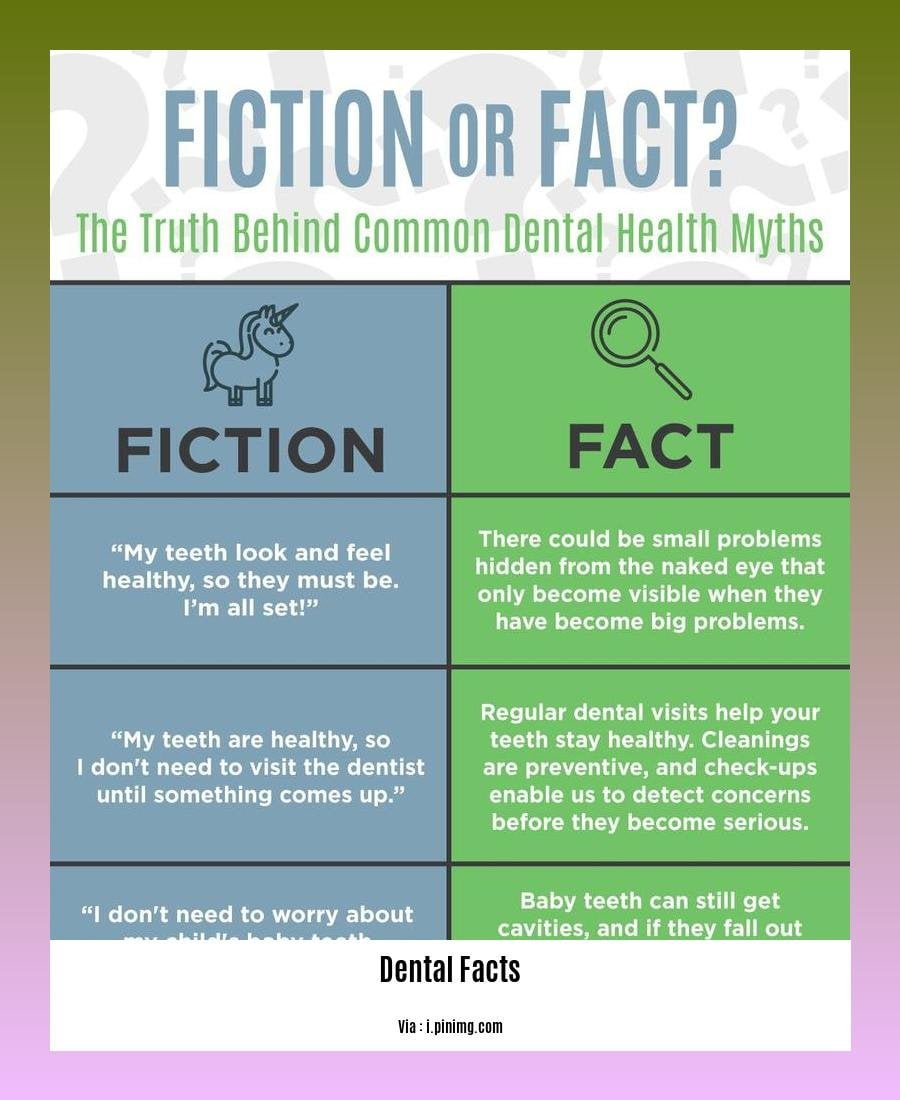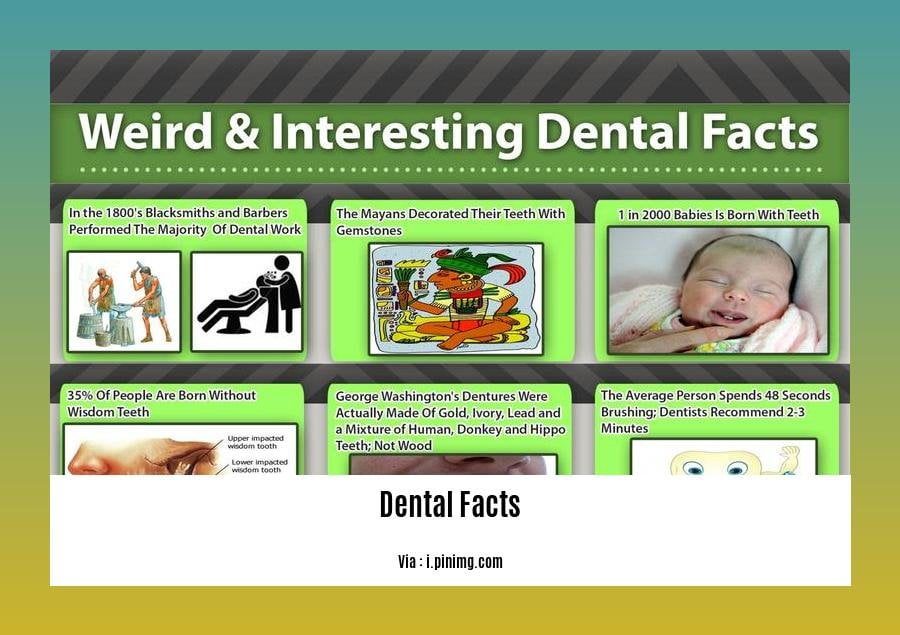Did You Know Dental Facts: Uncovering Surprising Truths About Oral Health
Discover a world of fascinating dental facts that will leave you amazed! From the intriguing history of dentistry to the surprising ways that animals take care of their teeth, this article dives deep into the lesser-known aspects of oral health. Prepare to be captivated by the secrets hidden in your own mouth and the remarkable powers of saliva. Get ready to dispel common dental myths and uncover the truth behind them. Get ready for a journey through the intriguing world of dental facts and be prepared to have your mind blown!
Key Takeaways:
- The most expensive tooth was sold for $35,700 in 1816. It belonged to Sir Isaac Newton.
- Dental plaque consists of more than 300 types of bacteria.
- Snails have over 25,000 teeth in their mouths.
- According to a survey, 59% of people would rather visit the dentist than listen to one end of a cell-phone conversation.
- Cheese is good for teeth as it reduces plaque acidity and helps remineralize the enamel.
- A sore jaw combined with chest pain can be a sign of a heart attack.
- Tooth prints are unique, similar to fingerprints.
- On average, women smile about 62 times a day.
- Different animals have different numbers of teeth: dogs have 42, cats have 30, pigs have 44, and armadillos have 104.
- The average person spends 38.5 days brushing their teeth in their lifetime.
- People only brush for 45 to 70 seconds a day on average, while the recommended time is 2-3 minutes.
Did You Know Dental Facts

The Most Expensive Tooth Belonged to Sir Isaac Newton
Did you know that the most expensive tooth in history belonged to none other than the renowned physicist Sir Isaac Newton? Back in 1816, his tooth was sold for a staggering $35,700! This bizarre dental fact highlights just how valuable our pearly whites can be, not only in terms of their importance for oral health but also as artifacts of historical significance.
Dental Plaque: A Haven for Bacteria
When it comes to dental hygiene, we often hear about the importance of removing dental plaque. But did you know that dental plaque is home to over 300 types of bacteria? These tiny organisms create a sticky biofilm on our teeth, making proper brushing and flossing crucial to maintain good oral health. So next time you brush, remember that you’re not just cleaning your teeth but also bidding farewell to hundreds of bacterial neighbors!
Snails: Unexpected Teeth Enthusiasts
Who would have thought that snails could be dental champions? These slimy creatures might not have a set of pearly whites like us, but their mouths can actually contain over 25,000 teeth! While these tiny teeth may not serve the same purpose as ours, they’re fascinating examples of nature’s diversity in dental structures. It’s yet another reminder that dental facts can be found in the most unexpected places.
Cell Phone Conversations vs. Dentist Visits
Have you ever found yourself in a situation where you’d rather visit the dentist than listen to one end of a cell phone conversation? Well, you’re not alone! According to a survey, a whopping 59% of people would choose a dental appointment over enduring this modern-day annoyance. It just goes to show how much we value our peace and quiet, even if it means opting for a dental check-up!
The Dental Benefits of Cheese
Cheese lovers, rejoice! Did you know that cheese can actually be good for your teeth? Cheese contains calcium and phosphorus, which help reduce the pH level in dental plaque, thus preventing tooth decay. Additionally, these nutrients promote the remineralization of tooth enamel, strengthening it against acid attacks. So, the next time you indulge in a cheese platter, savor it knowing that it’s not just delicious but also beneficial for your oral health.
A Sore Jaw: A Sign of More than Dental Woes
We all experience jaw pain from time to time, usually associated with dental issues. However, did you know that a sore jaw, when accompanied by chest pain, could be a symptom of a heart attack? It’s vital to pay attention to any unusual jaw discomfort, as it could be your body’s way of signaling a potential cardiac concern. This dental fact underscores the interconnectedness of our body systems and the importance of seeking medical help when needed.
Tooth Prints: As Unique as Fingerprints
You might have heard that fingerprints are unique to each individual, but did you know that tooth prints are just as distinctive? Similar to how our fingerprints can be used for identification purposes, dental professionals can also analyze and compare tooth prints for forensic investigations. So, the next time you show off your pearly whites, remember that they’re more than just a beautiful smile—they’re also uniquely yours!
Smiling: A Common Habit
Smiling is a universal language that transcends cultural boundaries. On average, women flash their smiles about 62 times a day, spreading joy and warmth wherever they go. So, as you go about your day, don’t forget to share your precious smiles with the world—they are powerful expressions of happiness and connection.
Counting Teeth in the Animal Kingdom
We often associate teeth with humans, but did you know that animals have their fair share of interesting dental facts? Dogs, our loyal companions, possess 42 teeth, while cats sport 30. Pigs, on the other hand, boast a total of 44 teeth, and the remarkable armadillo surprisingly sports a whopping 104! These dental variations in the animal kingdom remind us of the incredible diversity that exists in nature’s dental structures.
The Time We Spend Brushing
Have you ever wondered how much time we dedicate to brushing our teeth throughout our lives? On average, an American spends approximately 38.5 total days brushing their teeth! This dental fact serves as a reminder of the importance placed on oral hygiene and the commitment required to maintain good dental health. So make those brushing minutes count, and keep those pearly whites shining!
Brushing Time: Quantity vs. Quality
Here’s a surprising dental fact: while the recommended amount of time to brush your teeth is 2-3 minutes, the average person brushes for only 45 to 70 seconds each day! This means that many of us fall short of the ideal brushing time needed to effectively clean our teeth and gums. So, next time you reach for your toothbrush, challenge yourself to brush for the full recommended duration and savor the benefits of a thorough oral hygiene routine.
So, there you have it! These intriguing dental facts offer a glimpse into the fascinating world of oral health, highlighting the unique and often surprising aspects of dental care. Whether it’s the historical significance of a tooth’s value, the abundance of bacteria within dental plaque, or the dental peculiarities of snails and animals, there is always more to discover in the realm of dentistry. So, next time you visit the dentist, engage in a dental conversation, or simply smile, take a moment to appreciate the wonders and complexities of our oral health.
Did you know that dental health is not just about brushing and flossing? Discover some mind-blowing did you know facts about dental health that will leave you amazed and informed. Learn more about did you know facts about dental health!
Ever wondered what secrets the trees hold? Explore fascinating did you know facts about trees that will make you appreciate their importance and beauty. Discover amazing did you know facts about trees now!
Are you aware of the benefits available for disabled veteran divorced spouses? Uncover the valuable advantages and support through the disabled veteran divorced spouse benefits program. Find out more about disabled veteran divorced spouse benefits and how they can make a difference in your life.
Mouth and Saliva Facts

Did you know that your mouth is like a treasure trove of fascinating facts? From the incredible number of taste buds on your tongue to the surprising amount of saliva you produce daily, the oral cavity is truly a marvel. Let’s dive into some intriguing mouth and saliva facts that will leave you amazed.
The Power of Taste Buds
Have you ever wondered how many taste buds you have in your mouth? Well, prepare to be astonished because there are approximately 10,000 taste buds located mostly on your tongue. These tiny structures allow you to experience the wonderful world of flavors, from sweet and salty to sour and bitter. So the next time you savor a delicious meal, remember to thank your taste buds for their incredible work!
Unique Teeth, Just Like Fingerprints
Each person’s set of teeth is as unique as their fingerprints. Your teeth have their own distinctive characteristics, such as size, shape, and alignment. This uniqueness plays a crucial role in forensic dentistry, helping experts identify individuals based on their dental records. So, the next time you smile, remember that your teeth are one-of-a-kind!
The Surprising Saliva Stats
Now, let’s talk about saliva, the unsung hero of oral health. Did you know that the average human produces around 37,854 liters of saliva during their lifetime? That’s equivalent to filling two swimming pools! Saliva is not just water; it’s a complex fluid that plays a crucial role in defending against bacteria and tooth decay.
Saliva is primarily composed of 99% water, with the remaining 1% containing substances important for digestion, dental health, and controlling microbial growth in the mouth. Your salivary glands work tirelessly, producing about 1-2 liters of saliva every day. So, next time you swallow, remember to appreciate the incredible work of your salivary glands!
The Battle Against Tooth Decay
Tooth decay is a common dental issue, but did you know it’s the second most common disease caused by persistent damage to the hard surface of teeth? This damage leads to the formation of cavities, which can be painful and require dental intervention. That’s why maintaining good oral hygiene, including regular brushing, flossing, and dental check-ups, is essential for fighting tooth decay.
Saliva as a Diagnostic Tool
Saliva might hold more secrets than you think! Researchers have discovered its potential use in diagnosing various oral diseases, including oral cancers, gum disease, viral hepatitis, and even breast cancer. By analyzing specific substances present in saliva, healthcare professionals can detect these conditions early, significantly improving treatment outcomes. So, saliva is not just for digestion; it can also save lives!
Fun Trivia and Oral Health
Now, let’s take a quick detour into some fun dental trivia. Did you know that 90% of bad breath smells originate in the mouth? Or that the human mouth harbors more bacteria than there are people on Earth? It’s also interesting to note that brushing alone misses about 40% of tooth surfaces, emphasizing the importance of flossing.
Toothpaste and dental floss play essential roles in oral hygiene, and Americans purchase an astonishing 14 million gallons of toothpaste and over 3 million miles of dental floss annually. Blue toothbrushes are also more popular than red ones, showcasing our diverse toothbrush color preferences.
As for smiles, the average woman smiles about 62 times a day, while the average man smiles only 8 times. In today’s social media era, smiles have become even more significant, with 48% of young adults untagging themselves from photos on Facebook due to their imperfect smiles.
Key Takeaways:
- The mouth houses approximately 10,000 taste buds, allowing us to enjoy different flavors.
- Each person’s set of teeth is as unique as their fingerprints.
- Saliva is an amazing fluid, with the average person producing around 37,854 liters in their lifetime.
- Saliva helps defend against bacteria and tooth decay, thanks to its composition of water and essential substances.
- Tooth decay is the second most common disease globally, caused by damage to the tooth’s hard surface.
- Saliva has potential diagnostic applications for oral diseases and other health conditions like breast cancer.
- Interesting dental trivia includes the prevalence of bad breath originating from the mouth, the abundance of bacteria in our mouths, and the importance of flossing.
- Americans purchase vast amounts of toothpaste and dental floss, with blue toothbrushes being a popular choice.
- Smile stats reveal interesting differences between men and women, along with the impact of social media.
Citation:
– Fresh Implant & Dental Care – “Fun Facts About Your Mouth” (source)
– Hillsdale Dental Care – “75 Fun Dental Facts You Didn’t Know” (source)
So, the next time you brush your teeth or relish a flavorful meal, remember the incredible facts about your mouth and saliva. It’s truly a remarkable part of your body that deserves admiration and proper care.
Dental Facts And Myths
When it comes to dental care, there are plenty of facts and myths that can leave you scratching your head. In this article, we’ll uncover surprising truths about oral health and dispel common dental myths. Let’s dive in!
Fact #1: The Average American Falls Short on Brushing Time
Did you know that the average American spends a whopping 38.5 total days brushing their teeth during their lifetime? While that may sound impressive, here’s the catch – the recommended amount of time for brushing is 2-3 minutes. Shockingly, the average person only brushes for a mere 45 to 70 seconds a day, which falls significantly short of the mark. So, next time you’re brushing, make sure to give your pearly whites the attention they deserve.
Fact #2: Neglecting Dental Care Increases the Risk of Tooth Decay
It’s no secret that maintaining good oral hygiene is crucial for a healthy smile. Surprisingly, 25% of adults do not brush their teeth twice a day. This seemingly harmless neglect actually increases their risk of developing tooth decay by a staggering 33%. So, don’t let laziness get the best of you – make sure to brush twice a day to keep those cavities at bay.
Fact #3: Cavities Are More Common Than You Think
Speaking of cavities, did you know that a whopping 78% of Americans have had at least one cavity by the age of 17? That’s right – the majority of us have experienced the unwelcome visit from the tooth decay fairy. So, don’t feel alone if you’ve had your fair share of fillings. Remember to maintain a diligent oral hygiene routine and regular dental check-ups to stay ahead of those pesky cavities.
Fact #4: The Mouth’s Saliva Production Is Astounding
We often take saliva for granted, but did you know that a mouth produces an average of 10,000 gallons of spit during a lifetime? That’s enough to fill a small swimming pool! Saliva plays a crucial role in our oral health, helping to cleanse the mouth, neutralize acids, and aid in the digestion process. So, next time you’re moisturizing your smile, appreciate the incredible saliva production happening behind the scenes.
Fact #5: Dental Caries and Untreated Tooth Decay Are Common Issues
When it comes to dental health, statistics can be eye-opening. In adults aged 20 to 64, a staggering 91% have dental caries (tooth decay), and 27% have untreated tooth decay. These numbers highlight the importance of proactive dental care and the need for regular dental check-ups. Addressing tooth decay promptly can save you from unnecessary pain and costly treatments down the road.
Fact #6: Brushing Too Hard Can Do Damage
Think brushing your teeth harder will yield better results? Think again. Brushing too hard can actually harm your teeth and gums. It can wear down the protective enamel layer, leaving your teeth vulnerable to decay and sensitivity. Additionally, aggressive brushing can lead to gum recession, exposing the sensitive root surfaces. So, remember to brush gently yet thoroughly to keep your smile in tip-top shape.
Key Takeaways:
– The average American does not spend enough time brushing, falling short of the recommended 2-3 minutes.
– Neglecting dental care and not brushing twice a day increases the risk of tooth decay by 33%.
– Cavities are incredibly common, with 78% of Americans having experienced at least one cavity by the age of 17.
– Saliva production in the mouth is remarkable, with an average of 10,000 gallons produced during a lifetime.
– Dental caries and untreated tooth decay are prevalent issues in adults aged 20 to 64, affecting 91% and 27% respectively.
– Brushing too hard can harm teeth and gums by wearing down enamel and causing gum recession.
Sources:
- Hillsdale Dental Care: 75 Fun Dental Facts You Didn’t Know
- Dentaly.org: Dental Facts: Interesting and Fun Facts About Teeth
FAQ
Q1: What is the most expensive tooth ever sold and who owned it?
A1: The most expensive tooth belonged to Sir Isaac Newton and was sold for $35,700 in 1816.
Q2: How many types of bacteria are found in dental plaque?
A2: Dental plaque is made up of more than 300 types of bacteria.
Q3: How many teeth can a snail have in its mouth?
A3: A snail’s mouth can have over 25,000 teeth.
Q4: Are there any interesting facts about saliva?
A4: Yes, saliva plays a crucial role in defense against bacteria and tooth decay. The average human produces around 37,854 liters of saliva during their lifetime, which is equivalent to filling two swimming pools. Saliva is made up of 99% water, with the remaining 1% containing substances important for digestion, dental health, and control of microbial growth in the mouth. Salivary glands in the mouth produce about 1-2 liters of saliva daily. Saliva also has potential use in the diagnosis of oral diseases, breast cancer, oral cancers, gum disease, and viral hepatitis.
Q5: Are toothprints similar to fingerprints?
A5: Yes, toothprints are as unique as fingerprints.
- Unlock 6000+ words beginning with he: A comprehensive analysis - April 20, 2025
- Mastering -al Words: A Complete Guide - April 20, 2025
- Master Scrabble: High-Scoring BAR Words Now - April 20, 2025
















